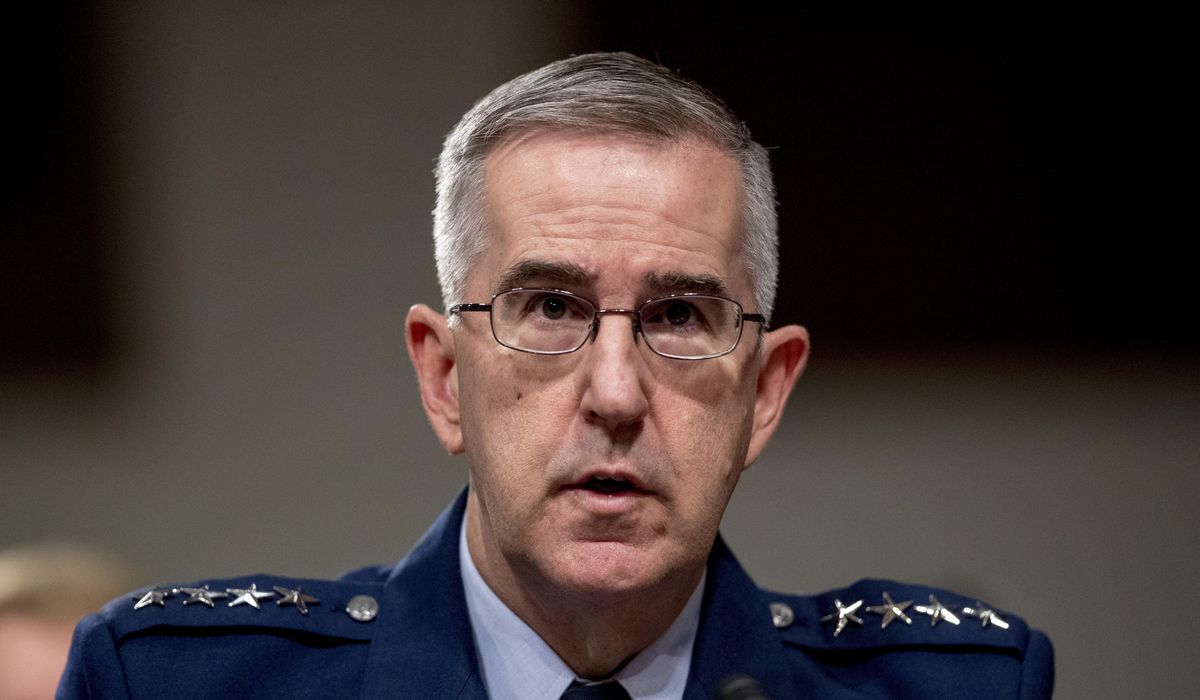

Something happened to the U.S. military over the past 20 years as it fought terrorists in Iraq and Afghanistan armed with homemade bombs and weapons more suitable for a museum than a battlefield. The nation’s second-most senior military leader says America’s fighting forces have become cumbersome and mired in bureaucracy.
On Monday, Gen. John E. Hyten, vice chairman of the Joint Chiefs of Staff, said that kind of mindset won’t work against China, the country’s No. 1 geopolitical rival. The approach to the global war on terror doesn’t work when facing a real country with a real army.
“When we didn’t have great powers we had to worry about, it was actually OK to put in place significant checks in the system to make sure nobody made a mistake — that we never moved forward until we knew exactly what was going to happen,” he told an audience at the newly formed Emerging Technologies Institute think tank Monday.
It was crucial back then, Gen. Hyten said, to ensure anything new — whether technology, weapons or operations — could pose no risk to the system.
“We took authority from the field and put it into committees in the Pentagon and then [they] would report to Congress. Then, Congress had committees to overlook the committees overlooking the field, to make sure we never made a mistake,” Gen. Hyten said.
“That’s OK when you don’t have a threat staring you in the face. Right now, we have significant threats staring us in the face,” he said.
Russia and especially China are investing heavily to get ahead of the U.S. on a number of fronts, especially in the space, cyber and nuclear realms. They understand the U.S. has had an advantage in those areas for years, Gen. Hyten said.
“If they can make that an advantage, we’re in a significant world of hurt,” he said. “This country still innovates and still has the technology advantage over anybody in the world. We’re just not taking advantage of it in the Department of Defense.”
After Monday’s event to announce the rollout of the new ETI think tank, retired Air Force Gen. Hawk Carlise, president of the National Defense Industrial Association, repeated a well-known joke that China was the actual winner of America’s 20-year global war on terrorism.
“While we were spending trillions of dollars and all of our innovative spirit in [the Middle East], they were studying us. They were studying everything we did,” he said. “The chief of staff of the Chinese air force told me, ‘We watched what you did and we did everything in our power to counter every advantage you have.’”
Ellen Lord, a former Defense Department acquisitions and sustainment undersecretary, serves on ETI’s advisory board, noted that the Pentagon must operate in a world underwritten and constrained by taxpayer dollars.
“There’s a lot of accountability for that. It’s a dynamic situation,” she said. “Dollars have to be accounted for. There’s a lot of oversight of that — whether it’s from within the executive branch or legislative branch.”
Former Texas Rep. Mac Thornberry, a Republican who chaired the House Armed Services Committee, said the Pentagon needs to do a better job adapting to the fast pace of rapidly changing technology.
“The Department of Defense is not able under its traditional 1960s-era budgeting programming to keep up,” he said. “We have to be more agile and faster to keep up with the change of technologies [and] to deal with the increasing threat from China.”
In the end, an authoritarian system like China has its drawbacks but can move swiftly when it needs to by government edict.
“Liberal democracy is the right answer, but we’ve got to make liberal democracy work at a pace that can counter the autocracy of the Chinese,” Gen. Carlisle said.
